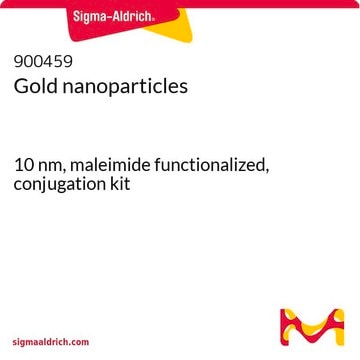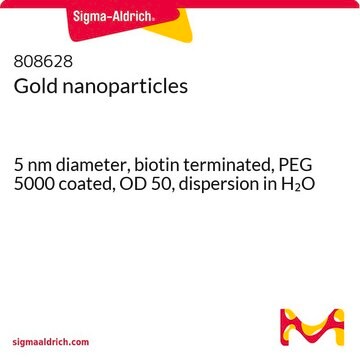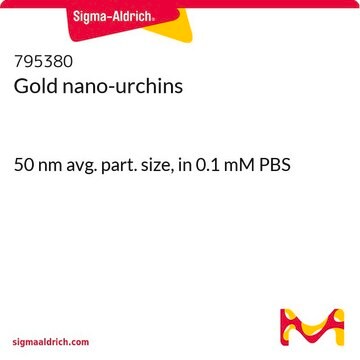752584
Gold nanoparticles
10 nm diameter, OD 1, stabilized suspension in 0.1 mM PBS, reactant free
Synonym(s):
Au NP, Gold colloid
About This Item
Recommended Products
Quality Level
form
nanoparticles
suspension
concentration
~6.0E+12 particles/mL
OD
1
diameter
10 nm
λmax
515-519 nm
storage temp.
2-8°C
SMILES string
[Au]
InChI
1S/Au
InChI key
PCHJSUWPFVWCPO-UHFFFAOYSA-N
Looking for similar products? Visit Product Comparison Guide
General description
Application
- Development of a biophotonic fiber sensor using direct-taper and anti-taper techniques with seven-core and four-core fiber for the detection of doxorubicin in cancer treatment.: Gold nanoparticles play a crucial role in enhancing the sensitivity and precision of fiber optic sensors for detecting chemotherapy drugs, demonstrating their significant potential in medical diagnostics and pharmaceutical research (Li et al., 2024).
- Generalized ratiometric surface-enhanced Raman scattering biosensor for okadaic acid in food based on Au-triggered signal amplification.: Gold nanoparticles are utilized to amplify Raman scattering signals, improving the detection of toxins in food products, which is essential for food safety and public health research (Wei et al., 2024).
Legal Information
Storage Class Code
12 - Non Combustible Liquids
WGK
nwg
Flash Point(F)
Not applicable
Flash Point(C)
Not applicable
Regulatory Listings
Regulatory Listings are mainly provided for chemical products. Only limited information can be provided here for non-chemical products. No entry means none of the components are listed. It is the user’s obligation to ensure the safe and legal use of the product.
JAN Code
752584-100ML-PW:
752584-25ML:
752584-BULK:
752584-VAR:
752584-100ML:
752584-25ML-PW:
Choose from one of the most recent versions:
Already Own This Product?
Find documentation for the products that you have recently purchased in the Document Library.
Customers Also Viewed
Articles
Steven J. Oldenburg, Ph.D. provides an overview of lateral flow diagnostic assays and discusses the use of ultra-bright reporter particles based on the unique optical properties of gold nanoshells that significantly increase the sensitivity of lateral flow immunoassays.
Sustainable energy sources with high production efficiency are crucial for meeting increasing energy demand.
Gold (Au) nanoparticles have tunable optical and electronic properties and are used in a number of applications including photovoltaics, sensors, drug delivery & catalysis.
Recent research highlights tunable properties of inorganic nanoparticles, driving interest in optoelectronics.
Our team of scientists has experience in all areas of research including Life Science, Material Science, Chemical Synthesis, Chromatography, Analytical and many others.
Contact Technical Service




